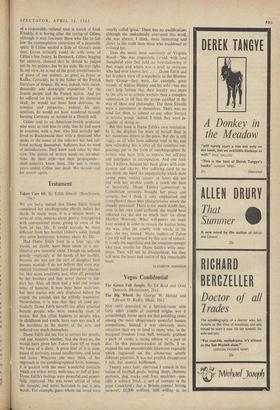Testament
WE are lucky indeed that Dame Edith Sitwell completed her autobiography shortly before her death. In many ways, it is a unique book : a series of witty remarks about poetry, interspersed with conventional prose, giving us some of the facts of her life. It could scarcely be more different from her brother Osbert's solid, though also often humorous, volumes about his life.
Had Dame Edith lived in a later age, she would, no doubt, have been taken to a psy- chiatrist ara 'neurotic' child. Though she suffered greatly—especially at the hands of her mother, because she was not the sort of daughter both Parents wanted—I do not believe that even psy- chiatric treatment would have altered her charac- ter. Her acute sensitivity was, after all, protected by her brothers and they never ceased to sup- port her. Also, all three had a wild and unique sense of humour. It may have been malicious, but their malice was only displayed before the stupid, the unkind, and the wilfully insensitive. Nevertheless, it is true that they all (and par- ticularly Dame Edith herself) too often attacked fiercely people who were unworthy even of notice. But this often happens to people who, in childhood and youth, have seen too much of the worthless in the matter of the arts, and suffered too much themselves.
Dame Edith did not live to correct her proofs, and one wonders whether, had she done so, she would have given her Taken Care Of so much the form of a diary. A great deal of it is corn- Posed of portraits, casual recollections, and loves and hates. Whatever one may think of her approach to the autobiographical form, however, It is packed with the most wonderful portraits Which are either witty, malicious, or full of love. Dame Edith's feelings were powerful and power- fully expressed. She was never afraid of what she thought, and never hesitated to put it into Words. For example, poets whom she loved were usually called 'great.' There was no qualification; although she undoubtedly over-used this word, she was always, I think, more interesting and closer to the truth than those who maddened or irritated her.
Thus she wrote most sensitively of Virginia Woolf—'She was exquisitely carved, with long thoughtful eyes that held, no foreshadowing of that tragic end which was a grief to everyone who had ever known her. . . .' Dame Edith and her brothers were all sympathetic to the Blooms- bury Group—they were, for example, great friends of Aldous Huxley and his wife—but one can't help feeling that their loyalty was more to the arts or to artistic warfare than a complete submission to all that the group signified in the way of ideas and philosophy. The three Sitwells were a movement in themselves. There was no need for them to submit to any other literary or artistic group; indeed, I think they were in- capable of doing so.
But this book is Dame Edith's own revelation. In it, she displays far more of herself than in her numerous letters to the press. But she is still cagey, as all who have suffered tend to be; and how refreshing this is after all the countless out- pourings put in the form of autobiographies by writers who have little to express but self-pity and indulgence in introspection. And one feels this, I believe, because her book glows with com- passion and charity. Her suffering (and let no one think she liked the unpopularity which most young. poets receive sooner or later) did not end with her terrible youth, a youth she bore so heroically. Dame Edith's conversion to Catholicism certainly brought her peace and serenity, but I think it only emphasised and strengthened those best characteristics which she already possessed. There is not much doubt that, even in her own cruel girlhood, she would have• reflected (as she did so much later on about Marilyn Monroe), 'What will-power she must have needed in order to remain the human being she was, after the cruelty with which, in the past, she was treated.' Many readers of Taken Care Of will be surprised by this sort of remark. It is only the superficial and the sensation-monger who look merely for Dame Edith's witty anec- dotes. They will not be disappointed, but they will miss the heart and centre of this remarkable book.
ELIZABETH JENNINGS






























 Previous page
Previous page